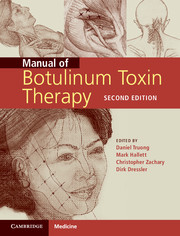Book contents
- Frontmatter
- Dedication
- Contents
- List of Contributors
- Preface
- Chapter 1 The pretherapeutic history of botulinum neurotoxin
- Chapter 2 Botulinum neurotoxin: history of clinical development
- Chapter 3 Pharmacology of botulinum neurotoxins
- Chapter 4 Immunological properties of botulinum neurotoxins
- Chapter 5 Treatment of cervical dystonia
- Chapter 6 Examination and treatment of complex cervical dystonia
- Chapter 7 Ultrasound guidance for botulinum neurotoxin therapy: cervical dystonia
- Chapter 8 Treatment of blepharospasm
- Chapter 9 Botulinum neurotoxin in oromandibular dystonia
- Chapter 10 Treatment of focal hand dystonia
- Chapter 11 Botulinum neurotoxin therapy of laryngeal muscle hyperactivity syndromes
- Chapter 12 The use of botulinum neurotoxin in otorhinolaryngology
- Chapter 13 Treatment of hemifacial spasm
- Chapter 14 Spasticity
- Chapter 15 The use of botulinum neurotoxin in spastic infantile cerebral palsy
- Chapter 16 The role of ultrasound for botulinum neurotoxin injection in childhood spasticity
- Chapter 17 The use of botulinum neurotoxin in spasticity using ultrasound guidance
- Chapter 18 The use of botulinum neurotoxin in tic disorders and essential hand and head tremor
- Chapter 19 Treatment of stiff-person syndrome with botulinum neurotoxin
- Chapter 20 Botulinum neurotoxin applications in ophthalmology
- Chapter 21 Cosmetic uses of botulinum neurotoxins
- Chapter 22 Hyperhidrosis
- Chapter 23 Botulinum neurotoxin A treatment for ischemic digits
- Chapter 24 Botulinum neurotoxin in wound healing
- Chapter 25 Use of botulinum neurotoxin in neuropathic pain
- Chapter 26 The use of botulinum neurotoxin in the management of headache disorders
- Chapter 27 The use of botulinum neurotoxin in musculoskeletal pain and arthritis
- Chapter 28 Treatment of plantar fasciitis with botulinum neurotoxins
- Chapter 29 Use of botulinum neurotoxin in the treatment of low-back pain
- Chapter 30 Use of botulinum neurotoxin in the treatment of piriformis syndrome
- Chapter 31 Ultrasound-guided botulinum neurotoxin injections for thoracic outlet syndrome
- Chapter 32 Botulinum neurotoxin in the gastrointestinal tract
- Chapter 33 Botulinum neurotoxin applications in urological disorders
- Index
- References
Chapter 33 - Botulinum neurotoxin applications in urological disorders
Published online by Cambridge University Press: 05 February 2014
- Frontmatter
- Dedication
- Contents
- List of Contributors
- Preface
- Chapter 1 The pretherapeutic history of botulinum neurotoxin
- Chapter 2 Botulinum neurotoxin: history of clinical development
- Chapter 3 Pharmacology of botulinum neurotoxins
- Chapter 4 Immunological properties of botulinum neurotoxins
- Chapter 5 Treatment of cervical dystonia
- Chapter 6 Examination and treatment of complex cervical dystonia
- Chapter 7 Ultrasound guidance for botulinum neurotoxin therapy: cervical dystonia
- Chapter 8 Treatment of blepharospasm
- Chapter 9 Botulinum neurotoxin in oromandibular dystonia
- Chapter 10 Treatment of focal hand dystonia
- Chapter 11 Botulinum neurotoxin therapy of laryngeal muscle hyperactivity syndromes
- Chapter 12 The use of botulinum neurotoxin in otorhinolaryngology
- Chapter 13 Treatment of hemifacial spasm
- Chapter 14 Spasticity
- Chapter 15 The use of botulinum neurotoxin in spastic infantile cerebral palsy
- Chapter 16 The role of ultrasound for botulinum neurotoxin injection in childhood spasticity
- Chapter 17 The use of botulinum neurotoxin in spasticity using ultrasound guidance
- Chapter 18 The use of botulinum neurotoxin in tic disorders and essential hand and head tremor
- Chapter 19 Treatment of stiff-person syndrome with botulinum neurotoxin
- Chapter 20 Botulinum neurotoxin applications in ophthalmology
- Chapter 21 Cosmetic uses of botulinum neurotoxins
- Chapter 22 Hyperhidrosis
- Chapter 23 Botulinum neurotoxin A treatment for ischemic digits
- Chapter 24 Botulinum neurotoxin in wound healing
- Chapter 25 Use of botulinum neurotoxin in neuropathic pain
- Chapter 26 The use of botulinum neurotoxin in the management of headache disorders
- Chapter 27 The use of botulinum neurotoxin in musculoskeletal pain and arthritis
- Chapter 28 Treatment of plantar fasciitis with botulinum neurotoxins
- Chapter 29 Use of botulinum neurotoxin in the treatment of low-back pain
- Chapter 30 Use of botulinum neurotoxin in the treatment of piriformis syndrome
- Chapter 31 Ultrasound-guided botulinum neurotoxin injections for thoracic outlet syndrome
- Chapter 32 Botulinum neurotoxin in the gastrointestinal tract
- Chapter 33 Botulinum neurotoxin applications in urological disorders
- Index
- References
Summary
Introduction
Botulinum neurotoxin (BoNT) is licensed for the treatment of a number of conditions characterized by striated muscle spasticity. However, in recent years, their unlicensed use in the treatment of lower urinary tract conditions has been described (Smith et al., 2004). Chief amongst these are conditions characterized by detrusor overactivity. Treatment of vulvodynia and chronic pelvic pain, benign prostate hyperplasia (BPH) and detrusor sphincter dyssynergia (DSD) are other emerging indications with promising positive results.
Overactive bladder
The International Continence Society (ICS) report of 2002 defined overactive bladder syndrome as urgency, with or without urge incontinence, usually with frequency and nocturia, and in the absence of local pathological or hormonal factors (Abrams et al., 2002). The prevalence in Europe and USA was estimated to be 3% among men 40–44 years of age, 9% among women 40–44 years of age, 42% among men 75 years of age or older and 31% among women 75 years of age or older (Tubaro, 2004). The symptoms of overactive bladder have many potential causes and contributing factors. Urination involves the cerebral cortex, the pons, the spinal cord, the peripheral autonomic, somatic and sensory afferent innervation of the lower urinary tract and the anatomical components of the lower urinary tract itself. Disorders of any of these structures may contribute to the symptoms of overactive bladder (Fig. 33.1).
Information
- Type
- Chapter
- Information
- Manual of Botulinum Toxin Therapy , pp. 288 - 294Publisher: Cambridge University PressPrint publication year: 2014
